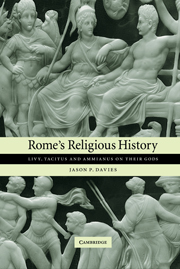4 - Tacitus and the restoration of Rome
Published online by Cambridge University Press: 21 December 2009
Summary
Just as the analysis of Livy's religious material required some awareness of his broader aims and methods, so too with Tacitus it is essential to acknowledge the way in which he undertook his project and what that was. Of course society had changed profoundly with the transition to empire and we should not expect that the eminently political act of writing history had not also adapted. Nonetheless we shall see that if circumstances and methods had changed, many similarities remain. Like his predecessor, Tacitus constructed a representation of Roman state religion from the events of the past: he ‘made sense’ of what had gone before and produced an account that reflect his idealised religious system while organising his coverage of events to argue a case. His was not the only possible version of events, even if we find it plausible historically: the historian/emperor Claudius, for instance, might have left us a very different version, given the chance. We shall therefore not only explore the way that religious institutions are represented, but also explore the agenda that helped to ‘inform’ the facts at Tacitus' disposal.
What emerges is a coherent programme, shaped by selectivity, powerful timing and presentation, with typically Tacitean vigour. He knew his own mind on religion, though this has not generally been the accepted viewpoint. Though many of the religious notices are apparently neutral, once we appreciate Tacitus' techniques of juxtaposing contradictory information, it will be clear that there is no such thing as ‘mere’ inclusion: virtually all ‘religious’ notices are pertinent and combine to create a picture of what is usually best described as incompetence.
- Type
- Chapter
- Information
- Rome's Religious HistoryLivy, Tacitus and Ammianus on their Gods, pp. 143 - 225Publisher: Cambridge University PressPrint publication year: 2005



